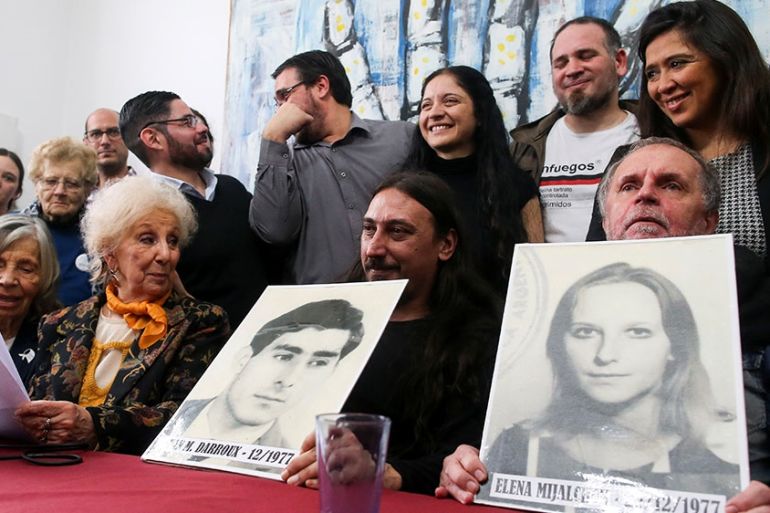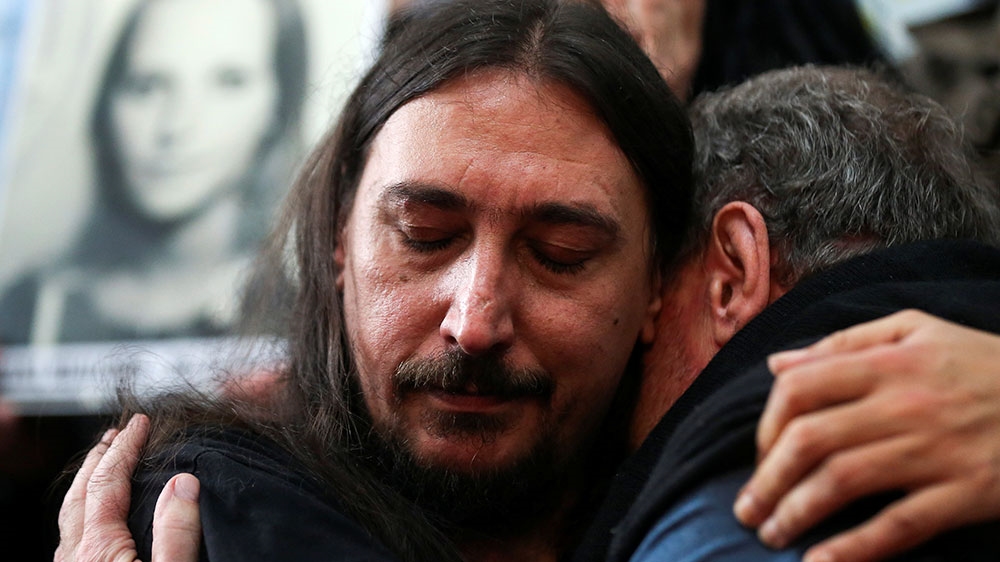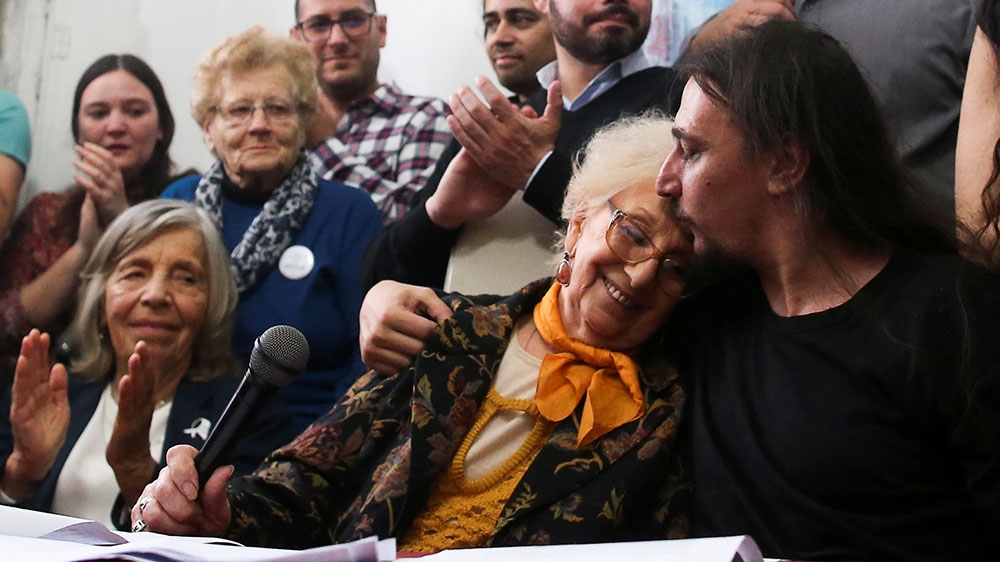Argentina group identifies 130th person taken during dictatorship
Javier Matias Darroux Mijalchuk, taken when he was a baby, says ‘recovering my identity is homage to my parents’.

Buenos Aires, Argentina – With the cacophony of a press conference just concluded around him, Roberto Mijalchuk sat silently at a table in the heart of the Argentine capital Buenos Aires, with a faraway look in his moist eyes.
He traced the edges of a sepia-toned photograph of his sister, Elena, one of Argentina‘s “desaparecidos” (disappeared) by the military dictatorship and its ruthless “Dirty War”. To one side, sat her son, Javier Matias, his long-lost nephew. To the other, and all around him, were members of the human rights group Abuelas de Plaza de Mayo, who helped bring them together.
Keep reading
list of 4 itemsWhat happens when activists are branded ‘terrorists’ in the Philippines?
Are settler politics running unchecked in Israel?
Post-1948 order ‘at risk of decimation’ amid war in Gaza, Ukraine: Amnesty
It took four decades, but on Thursday, one more piece in Argentina’s long process of reconstruction fell into place.
“Recovering my identity is, for me, an homage to my parents, a caress of the soul, a symbol of memory, truth, and justice,” Javier Matias Darroux Mijalchuk, 41, told more than 100 reporters, family and friends who gathered for the press conference, unveiling him as the 130th person to have discovered their true identity.

“If I had to pick one moment to define it, there is nothing more significant than the embrace with my uncle who, after 40 years of searching for me, was able to say: “Is it you, Javi?” And embraced me like no one had before, and no one will be able to again.”
The disappeared
Human rights groups estimate as many as 30,000 people were killed, tortured, jailed or forcibly disappeared during what the military government called a “national process of reorganisation” from 1976 to 1983. Left-wing activists, political armed groups, journalists, clergy and beyond became “desaparecidos”, or “the disappeared”. Among them were around 500 children, known as the stolen babies of the dictatorship. Many were born to mothers held in captivity, and later clandestinely placed in pro-military families as their true relatives searched in vain.
Established in 1977, the Abuelas (Grandmothers) of Plaza de Mayo joined the Mothers of Plaza de Mayo in demanding answers about the disappeared. They marched every week in front of the seat of government wearing their iconic white handkerchiefs over their heads.
The advent of DNA testing has been crucial to the Abuelas’ work; at least one person has had their identity restored nearly every year since 1978.
“My mother and I, after my father died, we always hoped that my sister, and that Javier, would still be alive,” said Mijalchuk on Thursday. “Our hopes got thinner with my sister, but we never, never lost faith with Javier. I saved a whole album of photos for the moment when he would arrive.”

It arrived in October 2016, when Javier was notified that DNA tests had confirmed he was the child of two disappeared people, and that he had an uncle who had been looking for him for four decades. It was Mijalchuk who called his nephew first. “Hi, I’m Javier’s uncle,” he remembers saying to his nephew’s wife, who answered the phone. “Who’s Javier?” she said, a memory they laugh at now.
Not much is known about what happened to Javier’s parents, which is why Javier wanted to go public now, even though the judicial system has not officially ruled on their cases.
Estela de Carlotto, the president of Abuelas de Plaza de Mayo, relayed the information they have: Javier’s father, Juan Manuel Darroux, worked for the Naval Prefecture in the 1960s, and then the University of Moron, in the province of Buenos Aires, in administrative work. That’s where he met Elena Mijalchuk, who was studying accounting.
Javier Matias, their first child, was born on August 5, 1977, in Buenos Aires. In early December of that year, Darroux went missing. A cousin was the last person who saw him, arguing with four men who forced him into a metallic blue Chevy. Elena, who was pregnant with the couple’s second child, received a letter from her husband, instructing her to meet up with some friends in the capital on December 26. She asked her parents to take her and Javier to the meeting spot.
She was last seen close to the Escuela de Mecanica de la Armada, known as the ESMA – the most notorious detention centre during the dictatorship. The centre was close to where records show that the infant Javier was found by a woman.
Records also show that, unlike other children who were appropriated, Javier’s adoption was done by the book and in good faith. He grew up knowing that he was adopted and his uncle described the people who raised him, now deceased, as loving.
Javier, who lives in the province of Cordoba and works in tourism, said he has long suspected, based on his personal convictions and personality, that he was a child of disappeared people. It wasn’t until he was 30, when he “adopted a social conscience and stopped navel-gazing” that he decided to donate his DNA to a databank, which would ultimately help identify his biological parents.
He went public with his story in the hopes of gaining more information, noting that for him “reconstructing the history of my parents and my sister or brother is a puzzle that will always be missing pieces.” He urged others who have doubts about their story to think about the person on the other side, who may be looking for them.
His uncle reflected on what these years have been like.
“A disappeared person is a dead person who comes back every day,” Mijalchuk said. “Every day. In such concrete terms as a tax bill that is found by someone who is waiting for a letter, like the one I’ve waited for from my sister, for more than 40 years.”